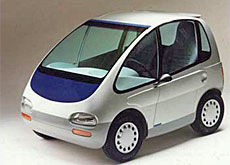
“One-litre car” could help traffic pollution

Swiss scientists believe a car that can travel 100 kilometres on one litre of fuel may go some way to solving the problem of traffic greenhouse gas emissions.
And they support a carrot-and-stick plan to penalise “dirty” car owners while rewarding green drivers. The Swiss have a larger appetite for big engine cars than their European neighbours.
Professors at the Energy Science Centre, attached to the Federal Institute of Technology in Zurich, presented their contribution to the one-litre car during Swiss Energy Week.
The automobile, manufactured by Swiss company Horlacher, is 75 per cent lighter than an average family car and guzzles a tenth of the fuel thanks to vastly improved aerodynamics.
One drawback is that it has no modern safety features. But the institute team is designing technology that lets cars communicate with each other to avoid collisions, using similar computer systems to those in aircraft.
“This car does compromise on style, speed and comfort, but you can’t have a free lunch,” the centre’s Lino Guzzella told swissinfo.
“Business as usual is no longer an option. If we are to survive in the future, we will have to drastically reduce carbon emissions.”
Incentives
There are an estimated 800 million cars in the world and in Switzerland there are 500 cars per 1,000 people, compared with 800 in the United States and fewer than 50 in India and China.
Swiss drivers also favour more powerful, carbon-spewing vehicles than the rest of western Europe. According to the European Automobile Manufacturers Association, the average car in Switzerland has a two-litre engine compared with 1.6 litres in neighbouring countries.
“The Swiss think they are better at cutting harmful emissions than anyone else, but they are not,” researcher Peter de Haan van der Weg told swissinfo.
He believes Switzerland should introduce incentives to make people buy cleaner cars. Some countries already have such schemes: the US awards tax breaks worth up to $3,000 (SFr3,800) and the Netherlands offers €6,000 (SFr9,500) to green car owners.
The Swiss authorities are currently mulling over two similar options presented by the city of Bern and the centre-left Social Democratic Party.
“Individuals are not capable of understanding the big picture because it is difficult for people to look 50 years into the future,” De Haan van der Weg said.
“Therefore it is necessary to have government regulations to force changes that will benefit the environment.”
swissinfo, Matthew Allen in Zurich
Swiss Energy Week ran from October 9-13, jointly hosted by the Federal Institute of Technology in Zurich and Academia Engleberg.
A variety of experts were invited to talk about issues relating to energy consumption and the environment. They also looked at ways countries can produce long-term affordable sustainable energy systems.
Some 40 professors at the Federal Institute of Technology in Zurich are currently carrying out research into sustainable energy projects under the auspices of the Energy Science Centre, which was founded in Zurich last year.
Switzerland currently produces around six tonnes of carbon emissions per capita. This compares with 20 tonnes in the US and a world average of four tonnes.
Of the total Swiss figure, 2.6 tonnes comes from transport, of which cars contribute 1.5 tonnes.

In compliance with the JTI standards
More: SWI swissinfo.ch certified by the Journalism Trust Initiative


































You can find an overview of ongoing debates with our journalists here . Please join us!
If you want to start a conversation about a topic raised in this article or want to report factual errors, email us at english@swissinfo.ch.